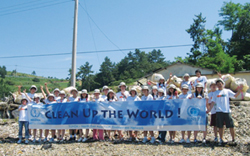
Starting this year, the Union of Student Clubs has set up a new project called the Environment Preservation Plan. The Union of Student Clubs has signed an agreement with the Office of Student Affairs stipulating that separate garbage bins for food, drink and recycling bins are to be stationed at the
Ewha GREEN
A few years ago, a tree made out of empty cans picked up from classrooms after lectures caught the attention of students walking past by the Student Union Building. Last year, Ewha students were able to get manicures with touch-me-not flowers and bought environmentally-friendly soap made with extractions from nature. Every year, Ewha GREEN, the only environmental club in Ewha, holds an Environment Week to promote environmental awareness among Ewha students.
Ewha GREEN is a club within Ewha that consists of members who wish to know more about nature and learn how to respect the environment. The club is one chapter in the larger environmental club, Green, which has chapters all around Korean universities. “I have been interested in the environment and non-governmental organizations ever since I was in high school. When I heard about the Ewha GREEN which fulfills the purpose of a NGO and my love for the environment, I joined without hesitation,” said Lee Yu-jin (Korean Literature, 3), the current representative of Ewha GREEN.
The Ewha GREEN holds various activities every year. This year, it plans to focus on programs for observing the ecosystem. Students are planning to visit places like the Han River, Jungnyangcheon, a river that flows from Gyeonggi to the Han River, or
“Believing that the environment is far away from you is a misconception. You might not be able to feel the connection between you and the environment and think that environment is something that only wealthy people who seek for well-being care about. However, the true definition of living a happy life begins with becoming friends with the fresh and green environment,” states Lee.
UNEP ANGEL
Falling under the umbrella of the United Nations Environment Program (UNEP), which coordinates environmental activities in the United Nations, the UNEP Angel serves as a unanimous representative among environmental clubs for university students. The UNEP Angel recruits about fifty students from the metropolitan area and fifty from other provinces each semester. Students who have respect for the environment constitute the members of the club.
The UNEP Angel values the harmony of action and does research about the environment. The club has organized a program with the UNEP called Ecoactivity to become the pioneers of protecting the environment and cultures. It participates in programs planned by the UNEP and also holds programs on their own, such as going to environmental campaigns during summer. “Last year, we went to Yeosu at Chonnam to protest against the factories that entered and polluted the clean water. We had the chance to meet the local culture of the area through the residents. On our last day, we campaigned in front of
Within the UNEP Angel, if the number of members from the same university exceeds five, then a branch is formed for the students of that university to organize independent activities at their school. “Last year, to emphasize the unique characteristic of being a women’s university, our branch plotted and held a workshop for promoting the use of environmentally-friendly pads,” says Choi Koh-eun (Mathematics, 4), the representative of the Ewha branch. The Ewha branch went to Cheonggyecheon, a stream flowing through the heart of
“Students usually believe that there is not much to know about the environment. However, after I participated in the activities held by the UNEP Angel, I realized that I had overlooked and did not know about a lot of important aspects of the environment. It is difficult to fall in love and think deeply about the environment without actually experiencing and being at the heart of these environmental activities,” says Kim.
Every year, there is a day on the calendar that is marked Arbor Day. The origin of that day derives from the effort to stimulate people to plant tress and conserve the forest. However, how many university students actually go and plant trees on Arbor Day?
Rather than just enjoying the day off with no regards to the actual meaning of Arbor Day like most university students, members of the
Starting with 100 students who went to
The main activities of
Yoon Jie-min (International Studies, 2), who has been selected as one of the members to go to China this year, is looking forward to meeting Chinese friends and is grateful for this chance to be enlightened about the seriousness of desertification in China by actually being at the spot of its origin. “
Other than the activities related to planting trees,
All of these students in each club participate by their own will in the name of protecting the environment. In comparison to participating in activities that are already planned out, these students actually jump into the reality of finding ways to become a help to the environment. “University students know that environment should be protected, but not many think about how we can actually protect it. It is an obligation for our generation, to leave a sustainable environment for the future generations,” adds Lee.

